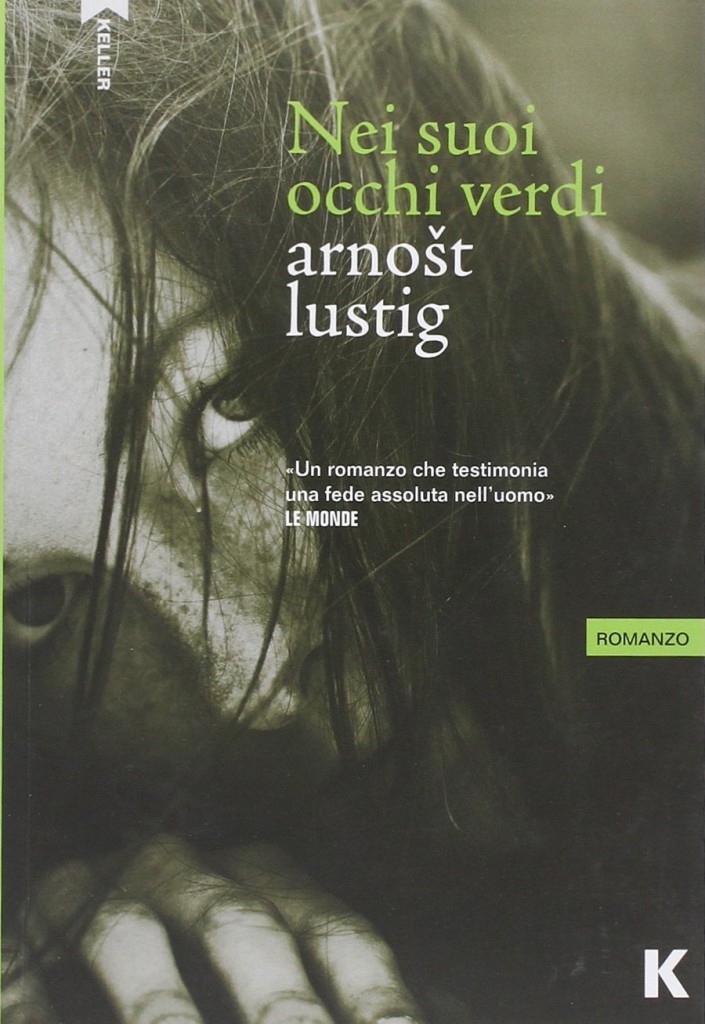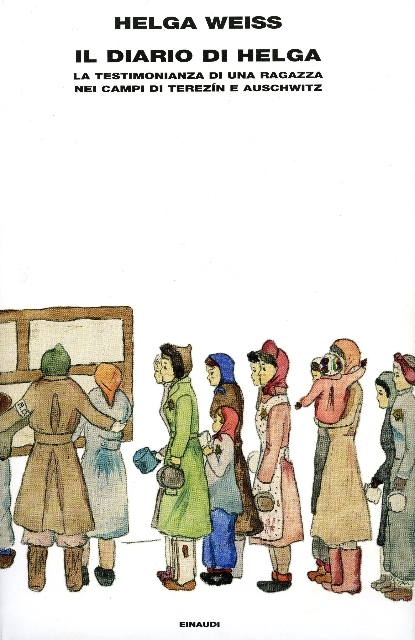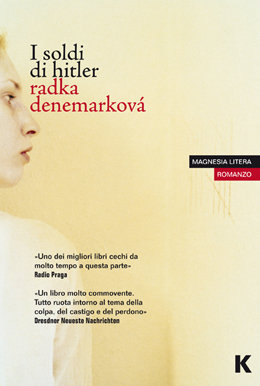Nei suoi occhi verdi
 Finally coming out in Italian, following the translation by Letizia Kostner for Keller Publishing house, is the work: “Nei suoi occhi verdi” by the Czech Jewish writer and Auschwitz survivor, Arnošt Lustig (1926-2011). Lustig, considered one of the most important European novelists of the twentieth century, and one of the greatest exponents of Czech literature, has won numerous awards in his life including the prestigious “Franz Kafka”. The novel tells the story of Hanka, a young girl, who arrives with her parents and brother at the concentration camp of Auschwitz. Hanka pretends to be an eighteen-year-old Aryan and becomes a camp prostitute, as indicated by the word “Feldhure” that is tattooed on her stomach. And so begins a long ordeal that will see her fight against cold and hunger, fear and shame, driven by a single desire, to survive, and the unshakable belief in succeeding. A novel, by Lustig, demonstrating absolute faith in mankind and forcing us to deeply question the human condition.
Finally coming out in Italian, following the translation by Letizia Kostner for Keller Publishing house, is the work: “Nei suoi occhi verdi” by the Czech Jewish writer and Auschwitz survivor, Arnošt Lustig (1926-2011). Lustig, considered one of the most important European novelists of the twentieth century, and one of the greatest exponents of Czech literature, has won numerous awards in his life including the prestigious “Franz Kafka”. The novel tells the story of Hanka, a young girl, who arrives with her parents and brother at the concentration camp of Auschwitz. Hanka pretends to be an eighteen-year-old Aryan and becomes a camp prostitute, as indicated by the word “Feldhure” that is tattooed on her stomach. And so begins a long ordeal that will see her fight against cold and hunger, fear and shame, driven by a single desire, to survive, and the unshakable belief in succeeding. A novel, by Lustig, demonstrating absolute faith in mankind and forcing us to deeply question the human condition.
Arnošt Lustig,
Nei suoi occhi verdi,
Keller editore: Rovereto 2014,
488 pp.
Il diario di Helga
 Born in 1929, Helga Weiss is a Czech painter and writer of Jewish origin. Having survived the ordeal of the Nazi concentration camps in Terezín and Auschwitz, her book “Helga’s diary”, translated into 14 languages, has also been published in Italian by Einaudi and was translated by Letizia Kostner. Nicknamed the “Anne Frank” from Prague, in this literary work, Helga Weiss gives us a written testimony of a girl who has witnessed with her own eyes how wickedness can transform a human being. Her only fault was that of being Jewish. This diary, written during the years of her captivity, is a remarkable document, both from an historical and human point of view. Helga writes and sketches daily what is happening around her with great lucidity and deep humanity. Of more than fifteen thousand children who were deported to the Terezín and Auschwitz camps, only about a hundred survived. Helga is one of them and has consigned this book to posterity so that all this will not be forgotten.
Born in 1929, Helga Weiss is a Czech painter and writer of Jewish origin. Having survived the ordeal of the Nazi concentration camps in Terezín and Auschwitz, her book “Helga’s diary”, translated into 14 languages, has also been published in Italian by Einaudi and was translated by Letizia Kostner. Nicknamed the “Anne Frank” from Prague, in this literary work, Helga Weiss gives us a written testimony of a girl who has witnessed with her own eyes how wickedness can transform a human being. Her only fault was that of being Jewish. This diary, written during the years of her captivity, is a remarkable document, both from an historical and human point of view. Helga writes and sketches daily what is happening around her with great lucidity and deep humanity. Of more than fifteen thousand children who were deported to the Terezín and Auschwitz camps, only about a hundred survived. Helga is one of them and has consigned this book to posterity so that all this will not be forgotten.
Helga Weiss,
Il diario di Helga. La testimonianza di una ragazza nei campi di Terezín e Auschwitz,
Einaudi: Turin 2014,
211 pp.
Miriam
 The first translation into Italian of the “Miriam” story by the Czech writer Ivan Klíma, edited by Maria Teresa Iervolino. The autobiographical account is based on the love of the author, during his adolescence, for Miriam, the young woman who was responsible for distributing milk to the prisoners of the Terezín concentration camp, where the story takes place. Klíma, who was born in 1931, was jailed for three and a half years during World War II in the concentration camp of the city, due to the family’s Jewish origin. In 1956, he graduated at the Charles University of in Prague (Faculty of Letters and Philosophy) with a thesis on Karel Čapek. He then worked as editor for major magazines and was a member of the Czechoslovak Communist Party from 1953 to 1967, the year when they expelled him for his dissident positions. An exile first in England then in the U.S., where he taught at the University of Michigan. He has received prestigious literary awards.
The first translation into Italian of the “Miriam” story by the Czech writer Ivan Klíma, edited by Maria Teresa Iervolino. The autobiographical account is based on the love of the author, during his adolescence, for Miriam, the young woman who was responsible for distributing milk to the prisoners of the Terezín concentration camp, where the story takes place. Klíma, who was born in 1931, was jailed for three and a half years during World War II in the concentration camp of the city, due to the family’s Jewish origin. In 1956, he graduated at the Charles University of in Prague (Faculty of Letters and Philosophy) with a thesis on Karel Čapek. He then worked as editor for major magazines and was a member of the Czechoslovak Communist Party from 1953 to 1967, the year when they expelled him for his dissident positions. An exile first in England then in the U.S., where he taught at the University of Michigan. He has received prestigious literary awards.
Ivan Klíma,
Miriam (translation by M.T. Iervolino),
Mephite: Avellino 2012,
60 pp.
I soldi di Hitler
 Radka Denemarková, (born 1968), is a writer, art historian, screen writer and Czech translator. The author of six novels and Czech translator of the 2009 German Nobel prize winner or literature, Herta Müller. Her book “Money from Hitler”, was considered the best novel of the year 2006 in the Czech Republic. The book comes out in Italian, after being translated by Angela Zavattieri, by the publishing house Keller. Denemarková’s novel, like many other of this year’s releases, depicts the events and the persecution of Jewish families during the Second World War and their troubled subsequent reintegration. The protagonist of the story is Gita, the daughter of a Czech-German family of Jewish origin. At the end of the war, Gita manages to return home by herself after being in a concentration camp, but on the return she finds that her house has been confiscated and her existence won’t be easy due to the German origins of her father, which have marked her family with the terrible label of being collaborators.
Radka Denemarková, (born 1968), is a writer, art historian, screen writer and Czech translator. The author of six novels and Czech translator of the 2009 German Nobel prize winner or literature, Herta Müller. Her book “Money from Hitler”, was considered the best novel of the year 2006 in the Czech Republic. The book comes out in Italian, after being translated by Angela Zavattieri, by the publishing house Keller. Denemarková’s novel, like many other of this year’s releases, depicts the events and the persecution of Jewish families during the Second World War and their troubled subsequent reintegration. The protagonist of the story is Gita, the daughter of a Czech-German family of Jewish origin. At the end of the war, Gita manages to return home by herself after being in a concentration camp, but on the return she finds that her house has been confiscated and her existence won’t be easy due to the German origins of her father, which have marked her family with the terrible label of being collaborators.
Radka Denemarková,
I soldi di Hitler (or.tit.: Peníze od Hitlera, 2006),
Keller: Trento 2012,
320 pp.




